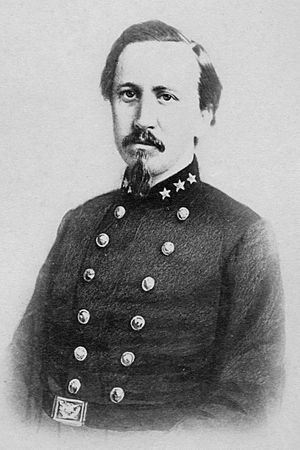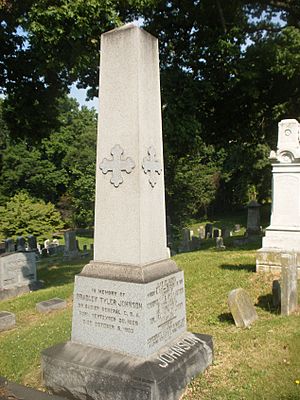Bradley Tyler Johnson facts for kids
Quick facts for kids
Bradley Tyler Johnson
|
|
|---|---|
 |
|
| Member of the Virginia Senate from the Virginia's 7th Senate district district |
|
| In office 1875–1877 |
|
| Personal details | |
| Born | September 29, 1829 Frederick City, Maryland, US |
| Died | October 5, 1903 (aged 74) Amelia, Virginia, US |
| Political party | Democratic |
| Occupation | Lawyer |
| Signature | |
| Military service | |
| Allegiance | |
| Branch/service | |
| Rank | |
| Commands | |
| Battles/wars | |
Bradley Tyler Johnson (born September 29, 1829 – died October 5, 1903) was an American lawyer, soldier, and writer. Even though his home state of Maryland stayed with the Union during the American Civil War, Johnson chose to serve as a brigadier general in the Confederate States Army. He helped create a special group called the Maryland Line for the Confederacy and later led the 1st Maryland Infantry, CSA.
Contents
Early Life and Education
Bradley Tyler Johnson was born in Frederick City, Maryland. He went to Princeton and graduated in 1849. After that, he studied law and earned his law degree from Harvard. He became a lawyer in 1851.
In 1851, he married Jane Claudia Saunders. They had a son named Bradley Saunders Johnson.
In 1860, Johnson was a delegate at the National Democratic Convention in Baltimore. He joined the group that supported John C. Breckinridge and Joseph Lane.
Serving in the Civil War
When the Civil War started, Johnson used his own money to organize and equip a group of soldiers. He was very active in forming the 1st Maryland Infantry, CSA. He became a major and then a colonel in this regiment. He turned down a higher rank in a Virginia regiment because he felt his duty was to his home state of Maryland.
By May 1861, about 500 Marylanders gathered at Harper's Ferry, Virginia, under Johnson's command. They formed eight companies of Maryland infantry. Johnson wanted Marylanders to fight under their own flag.
Facing Challenges and Battles
In May 1862, some soldiers in the 1st Maryland Regiment wanted to leave because their first year of service was ending. Colonel Johnson had to convince them to stay and fight. He gave a powerful speech, reminding them of their duty and honor. His words worked, and the soldiers decided to stay and fight.
At the Battle of Front Royal on May 23, 1862, Johnson's 1st Maryland (CSA) fought against another Maryland regiment, the 1st Regiment Maryland Volunteer Infantry (USA). This was a unique event in American military history, as two regiments from the same state with the same number fought each other.
Just two days later, on May 25, 1862, the 1st Maryland fought in the First Battle of Winchester. They also fought at the Battle of Cross Keys on June 8. In this battle, Johnson's troops successfully defended against attacks from Union soldiers.
Later Campaigns and Promotion

Johnson also served in the Seven Days Battles in 1862. This was a series of major battles near Richmond, Virginia, where Confederate General Robert E. Lee pushed back the Union Army of the Potomac.
After the Battle of Cedar Mountain, Johnson took command of the Second Brigade. He led this brigade in the Second Battle of Manassas. In 1864, Johnson was promoted to the rank of brigadier general of cavalry.
Towards the end of the war, Johnson was in charge of the post at Salisbury, N.C.. He worked to improve conditions for prisoners of war there and helped them get released.
Life After the War
After the Civil War, Bradley Tyler Johnson worked as a lawyer in Richmond until 1879. He then moved to Baltimore.
In 1875, Johnson was elected to the Virginia State Senate as a Democrat. He initially had support from African Americans, with "Johnson clubs" forming to back him. However, he soon lost their support when other candidates, William Carter Knight and Patrick Henry Starke, ran as Independents and promised to fight for civil rights. Many African-American voters then switched their support to Knight and Starke.
After his wife passed away, Johnson moved to Amelia, Virginia, where he died. He was buried in Baltimore at Loudon Park Cemetery.
Selected Writings
Bradley Tyler Johnson was also a writer. Some of his works include:
- Reports of Chase's Decisions on the Fourth Circuit (1875)
- Memoir of Joseph E. Johnston (1891)
- Foundation of Maryland and the Maryland Act Concerning Religion (1883)
- Life of General Washington (1894)
- Maryland in Confederate Military History (1899)
 | William L. Dawson |
 | W. E. B. Du Bois |
 | Harry Belafonte |

